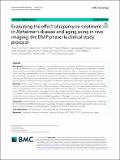Evaluating the effect of rapamycin treatment in Alzheimer’s disease and aging using in vivo imaging: the ERAP phase IIa clinical study protocol
Author(s)
Svensson, Jonas E.; Bolin, Martin; Thor, Daniel; Williams, Pete A.; Brautaset, Rune; Carlsson, Marcus; Sörensson, Peder; Marlevi, David; Spin-Neto, Rubens; Probst, Monika; Hagman, Göran; Morén, Anton Forsberg; Kivipelto, Miia; Plavén-Sigray, Pontus; ... Show more Show less
Download12883_2024_Article_3596.pdf (1.316Mb)
Publisher with Creative Commons License
Publisher with Creative Commons License
Creative Commons Attribution
Terms of use
Metadata
Show full item recordAbstract
Background
Rapamycin is an inhibitor of the mechanistic target of rapamycin (mTOR) protein kinase, and preclinical data demonstrate that it is a promising candidate for a general gero- and neuroprotective treatment in humans. Results from mouse models of Alzheimer’s disease have shown beneficial effects of rapamycin, including preventing or reversing cognitive deficits, reducing amyloid oligomers and tauopathies and normalizing synaptic plasticity and cerebral glucose uptake. The “Evaluating Rapamycin Treatment in Alzheimer’s Disease using Positron Emission Tomography” (ERAP) trial aims to test if these results translate to humans through evaluating the change in cerebral glucose uptake following six months of rapamycin treatment in participants with early-stage Alzheimer’s disease.
Methods
ERAP is a six-month-long, single-arm, open-label, phase IIa biomarker-driven study evaluating if the drug rapamycin can be repurposed to treat Alzheimer’s disease. Fifteen patients will be included and treated with a weekly dose of 7 mg rapamycin for six months. The primary endpoint will be change in cerebral glucose uptake, measured using [18F]FDG positron emission tomography. Secondary endpoints include changes in cognitive measures, markers in cerebrospinal fluid as well as cerebral blood flow measured using magnetic resonance imaging. As exploratory outcomes, the study will assess change in multiple age-related pathological processes, such as periodontal inflammation, retinal degeneration, bone mineral density loss, atherosclerosis and decreased cardiac function.
Discussion
The ERAP study is a clinical trial using in vivo imaging biomarkers to assess the repurposing of rapamycin for the treatment of Alzheimer’s disease. If successful, the study would provide a strong rationale for large-scale evaluation of mTOR-inhibitors as a potential disease-modifying treatment in Alzheimer’s disease.
Trial registration
ClinicalTrials.gov ID NCT06022068, date of registration 2023–08-30.
Date issued
2024-04-04Department
Massachusetts Institute of Technology. Institute for Medical Engineering & ScienceJournal
BMC Neurology
Publisher
Springer Science and Business Media LLC
Citation
BMC Neurology. 2024 Apr 04;24(1):111
Version: Final published version
ISSN
1471-2377
Keywords
Neurology (clinical), General Medicine